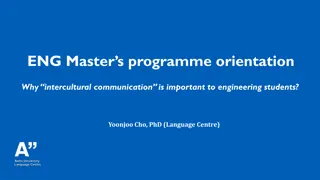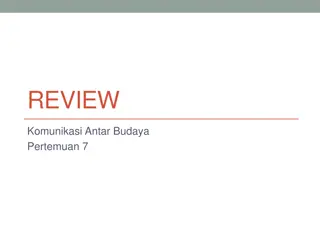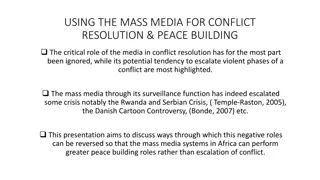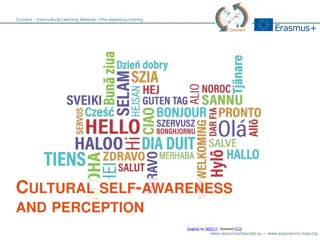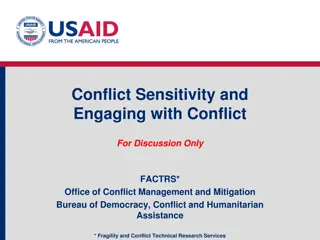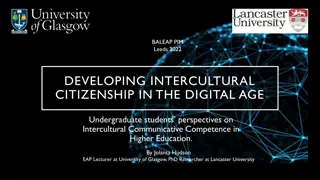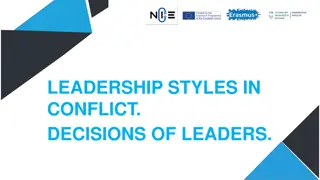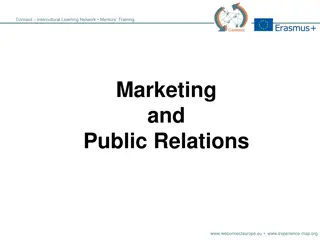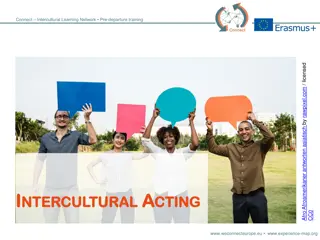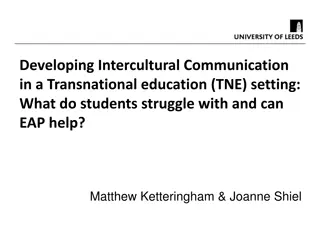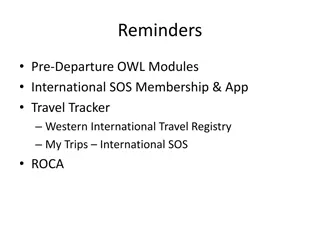Effective Conflict Resolution in Intercultural Language Centers
Misunderstandings and conflicts are inevitable in language centers, often stemming from diverse cultural backgrounds. Robert Smeaton, an experienced educator, leads discussions on de-escalation strategies and the role of intercultural sensitivity in resolving issues between students and staff. Participants reflect on soft skills needed to support upset students and explore ways to overcome common difficulties such as study goal failures, assessment concerns, and fixed learning expectations. The session emphasizes fostering a supportive environment through effective communication and understanding.
Download Presentation

Please find below an Image/Link to download the presentation.
The content on the website is provided AS IS for your information and personal use only. It may not be sold, licensed, or shared on other websites without obtaining consent from the author.If you encounter any issues during the download, it is possible that the publisher has removed the file from their server.
You are allowed to download the files provided on this website for personal or commercial use, subject to the condition that they are used lawfully. All files are the property of their respective owners.
The content on the website is provided AS IS for your information and personal use only. It may not be sold, licensed, or shared on other websites without obtaining consent from the author.
E N D
Presentation Transcript
Conflict resolution and de-escalation in an intercultural context: a reflection on practice Notes from the discussion led by Robert Smeaton UECA PD Fest, Melbourne, Saturday 29 July 2017 hawthornenglish.com
Robs biography Robert Smeaton is currently Senior Teacher - Student Liaison at Hawthorn-Melbourne a unique position in an ELICOS college. In twenty years of international and local experience in the TESOL field, he has held a range of posts including teacher, Independent Learning Centre Co-ordinator and Director of Studies. Robert enjoys his current role as Senior Teacher Student Liaison because it encompasses problem solving, conflict resolution and building relationships with key internal and external stakeholders. In an international education context, misunderstandings can and do arise, and it is in this significant and sensitive aspect of the life of the school community, that Robert mentors and advises students, teachers and other colleagues. hawthornenglish.com
Summary Misunderstanding is an inevitable and even essential aspect of what occurs in the language classroom, and indeed in the wider context of the language school. Do you ever wonder how culture plays a role in misunderstanding or conflict between your students, or between teachers and students? How do we sensitively communicate with staff, and our international students when misunderstandings occur? How do we, as they say, move things forward ? How does our intercultural sensitivity assist this process? How do we provide ongoing support to our students, particularly when life is not going well? How can we convey this in a sensitive manner? These are the questions that Robert explored with teachers and other staff who regularly perform a counselling role. The session covered a range of common difficulties and unpacked the cultural elements that contribute to them and provided specific strategies to de-escalate potentially serious problems. Participants were asked to reflect on their own best practice, and share these in discussions. The discussion finished with Robert s own checklist of soft skills that can have a powerful effect. hawthornenglish.com
Some of the questions we discussed 1. What types of misunderstandings or conflicts occur in English language centres? What soft skills would you bring to your interaction with a student who is upset or confused about an aspect of their studies in the centre What is intercultural sensitivity ? 2. 3. hawthornenglish.com
Some types of misunderstandings and conflicts that were discussed Failure to achieve study goals Questioning the assessment process Fixed expectations of learning and teaching Complaints about teachers Challenging interactions between classmates hawthornenglish.com
Soft Skills Checklist (Nb. This is not an exhaustive list!) Rapport and Needs Analysis Establish classroom expectations early Elicit expectations of behaviour from students Get straight to work! Ask students about themselves and their goals. Listen Let the person express how they are feeling. Ask how they feel and acknowledge their feelings. Don t assume you know someone s culture Bring your own understanding of culture to the interaction but expect to be surprised! Ask rather than pronounce. Don t make a promise you can t keep Understand the limits of your role. Share responsibility with colleagues. Stick to your organisation s stated policy and procedures Make a recommendation to your manager if necessary. Allow the process to happen. Don t give your opinion on a policy even if you personally disagree with it. hawthornenglish.com
Soft Skills Checklist continued Learn to live with Manager Shopping ! Accept that a student may see another colleague if you don t give them the answer they want to hear. Be consistent in what you say and work as a team Have a conversation, not a debate Don t see the interaction as an argument that you need to win. Don t feel that you need to find a solution Provide possible options but allow time for people to think Bring an end to the conversation Explain that there is a time limit to the conversation Explain the actions you will take Suggest actions the student could take while they are waiting for an answer Don t merely do, be seen to have done! Follow up with the student Document what you do E.g. email to your manager Be genuine in what you do! hawthornenglish.com


